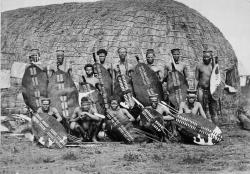
Published date
Natal in the early years of the 20th century became the site of conflict between Colonial Administrators and autonomous African chiefdoms. The death of Cetshwayo in Eshowe in 1884, the last of the independent Zulu kings left the task of resistance to colonial rule to be pursued by minor chiefs. By 1906, one of the most formidable of these chiefs,
Bambatha, resisted colonial measures imposing a poll tax on his subjects in addition to the hut tax. This led to first a stand off between him and the colonial officials. Bambatha was determined to resist the 1 pound poll tax imposed by the colonial government. The divisional magistrate in Bambatha's area, T. R. Bennet was equally determined to carry out the task of collecting taxes from Bambatha's subjects.
When Bennet arrived in Bambatha's homestead he was threatened by Bambatha and the rebels he had mobilized. The next day the colonial government dispatched a party of fourteen policemen under the leadership of Sub Inspector Hunt to arrest Bambatha and the rebels. Two policemen were killed and the rest were forced to retreat. It became clear that Bambatha was not to be intimidated. This marked the beginning of Bambatha Rebellion.
Bambatha, sensing that the colonial government was most likely to mount reprisals against him, fled north and sought refuge and support from Zulu King, Dinizulu. Dinizulu gave tacit support to Bambatha. He returned to Mpanza valley and discovered that he had been deposed by the colonial government. This led to open hostilities between Bambatha and the colonial government that lasted until April. And in late April 1906 Colonel Duncan Mckenzie led an expedition of colonial troops against Bambatha. In the ensuing uneven conflict, Bambatha was defeated and subsequently beheaded.
The outcome of the Bambatha rebellion has gone down in history as the last of the primary resistance movements that were superseded by the establishment of the African National Congress in 1912. Bambatha is still regarded as a hero in the literature on resistance too colonial rule.
Boddy-Evans, A, The Bambatha Rebellion - Part 2, from About.com, [online], Available at africanhistory.about.com [Accessed: 3 February 2011]|SAHO, Bambatha Rebellion 1906, from South African History Online, [online], Available at www.sahistory.org.za/pages [Accessed on 12 February 2013]